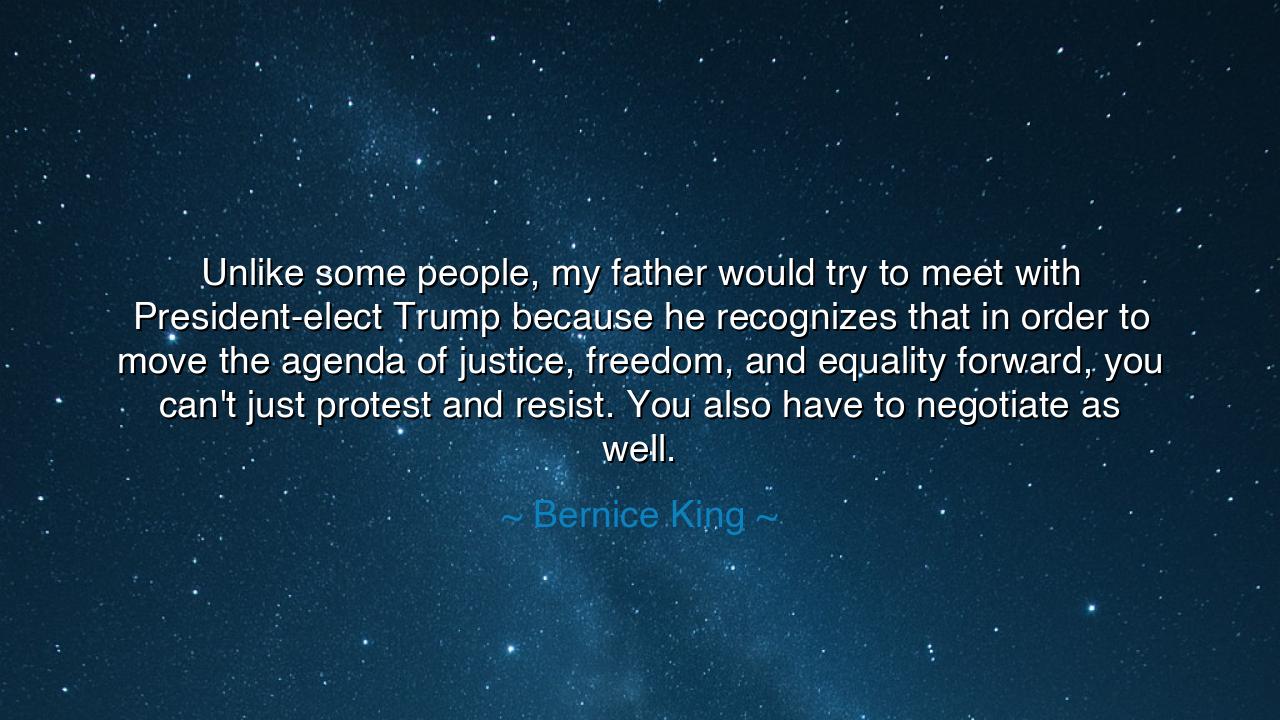
Unlike some people, my father would try to meet with
Unlike some people, my father would try to meet with President-elect Trump because he recognizes that in order to move the agenda of justice, freedom, and equality forward, you can't just protest and resist. You also have to negotiate as well.






"Unlike some people, my father would try to meet with President-elect Trump because he recognizes that in order to move the agenda of justice, freedom, and equality forward, you can't just protest and resist. You also have to negotiate as well." These words from Bernice King echo a powerful and ancient truth—justice, freedom, and equality are not achieved solely through protest and resistance. They are advanced through a balance of action, negotiation, and dialogue. This wisdom speaks to the complexity of creating change in a world where adversaries often hold power. It is not enough to simply stand in opposition; one must also be willing to engage, to communicate, and to find common ground in the pursuit of a better society.
In the ancient world, the greatest leaders understood that the path to justice was not a single road, but a multifaceted journey. Socrates, while known for his commitment to truth and virtue, also understood the importance of dialogue. His method, known as the Socratic method, was a form of negotiation—a way of questioning and conversing to seek truth and reach understanding, even with those who did not share his beliefs. Similarly, the legendary Alexander the Great was not only a conqueror but also a strategist who knew that peace and justice often required negotiation with those who had once been adversaries. Bernice King’s words call us to reflect on the balance between resistance and negotiation, urging us to act but also to engage, to meet with those who may oppose us in order to move forward the cause of equality.
Her reference to her father, Dr. Martin Luther King Jr., is deeply significant. In his pursuit of racial equality and justice, Dr. King was both a tireless protester and a skilled negotiator. His marches, such as the famous March on Washington, were monumental in raising awareness for civil rights and drawing attention to the systemic injustices faced by African Americans. Yet, Dr. King also understood that lasting change required more than just visible acts of protest. It required negotiation with those in power, including political figures and government officials. In 1963, his Letter from Birmingham Jail made clear his belief that it was not enough to simply resist; he also called for direct action, which included constructive negotiation and dialogue with authorities. His ability to protest, while still being willing to engage with those who opposed his views, is what made him one of history's most effective leaders for justice.
The wisdom Bernice King shares reflects the complex nature of the work required to advance justice. The tension between resistance and negotiation is not a new one. Consider the work of Nelson Mandela, whose long fight against apartheid in South Africa was marked by both resistance and negotiation. In the face of oppression, Mandela spent years in prison, and his resistance became the symbol of the struggle for racial equality. But it was only when he and the South African government engaged in negotiations that apartheid was ultimately dismantled. Mandela’s ability to navigate both the path of protest and the path of dialogue with those in power led to the birth of a new South Africa—one where freedom and equality could be pursued for all its citizens.
The lesson here is that justice and equality cannot be achieved through resistance alone, nor can they be won solely through negotiation. Both elements are necessary. It is through resistance that we call attention to injustice, and through negotiation that we open doors to compromise and action. Bernice King’s call to negotiate as well as protest is a call to embrace wisdom and strategy in the fight for a more just world. Just as the great leaders of the past understood the power of both resistance and negotiation, so too must we recognize the importance of balancing these two forces in our own fight for equality.
In our own lives, we must not be satisfied with simple protest against what is wrong. While protest is necessary to raise awareness and to challenge unjust systems, it is the negotiation that will bring about true, lasting change. In every situation, whether in politics, business, or community life, we must learn to engage with those we disagree with, to listen, to find common ground, and to push for change through constructive dialogue. As Dr. King demonstrated, the path of justice is never easy, but it is one that requires both the courage to challenge and the wisdom to engage.
So, future generations, take this wisdom to heart: in the pursuit of justice and equality, there will always be moments of resistance. But do not shy away from the negotiation that is also necessary to move society forward. Engage with those who oppose you, not with hatred or fear, but with the desire to advance justice. Protest when you must, but also negotiate when you can. Only through the union of both can we build a world where freedom and equality are the rights of all, and where the march for justice continues, strengthened by both the passion to resist and the wisdom to engage.






AAdministratorAdministrator
Welcome, honored guests. Please leave a comment, we will respond soon